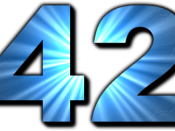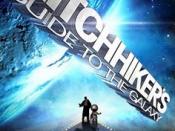Douglas Adams's, author of the famous "!Hitchhiker's Guide to the Galaxy" series, which includes "Hitchhikers Guide to the Galaxy", "Restaurant at the End of the Universe", "Life, the Universe, and Everything", "So Long, And Thanks For All the Fish", "Young Zaphod Plays It Safe", and "Mostly Harmless", combination of both satirical and tedious word choice brings out the sense of humor within the reader. The seriousness of which he writes his satire is what makes it a satire.
His use of "boring" is especially useful when it comes to such things as showing the reader the tedium and uselessness of committee meetings, as seen in the book Mostly Harmless. The Hitchhiker's series was thought up in Adam's first cross between a satirical and drunken thought, though more were to come. This idea was also boring and simple in its own way. The idea was this, "Why doesn't England have a guide for hitchhikers?" Adam's went on to write a television show about it, which he then decided to convert into a book.
Adams uses his boring tone and seriousness as to such ideas on how to get rid of useless people or express his anger at the passion of the Christ. He even goes on to make-fun of bureaucracy via the Vogons. The reader even may begin to think he is poking fun at leadership when he created the three-armed, two-headed, hippee president of the galaxy.
Obviously, the tone and diction used by Adams in the series cannot possibly be shown in the film version, even with Adams as guest director. It shows too, as it seems the book has been shredded, glued together, buried, found and eaten by a Ravenous Bugsplatter Beast of Traal, and then probably found somewhere quite inhospitable. To get to the point,


